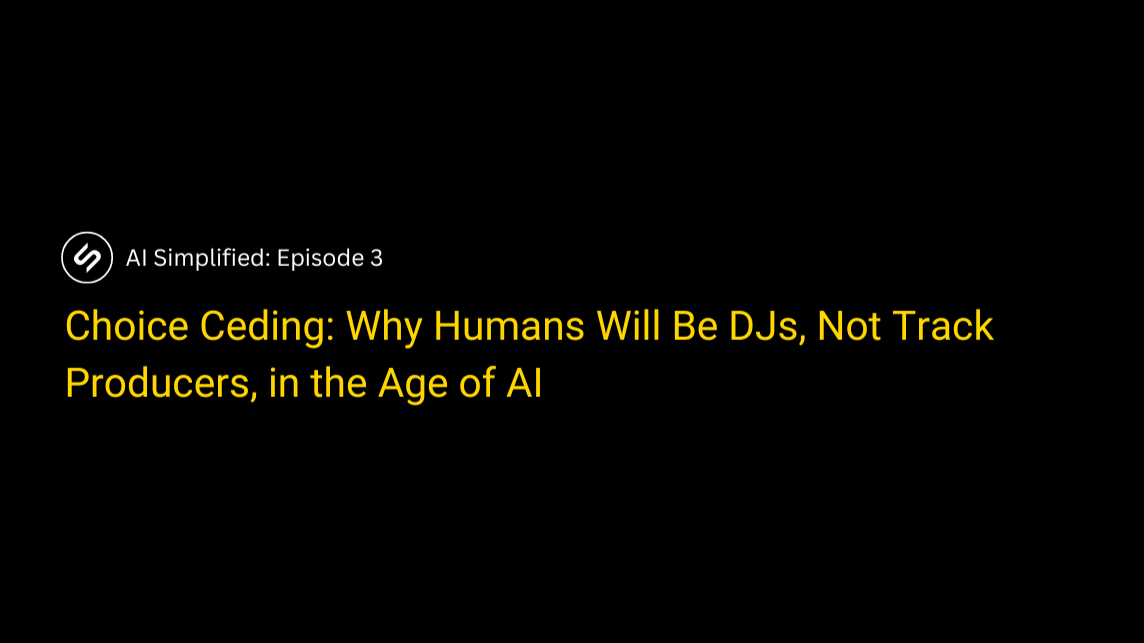
This post was originally published by us on LinkedIn: https://www.linkedin.com/pulse/choice-ceding-why-humans-djs-track-producers-age-ai-singulatron-2zpff.
Choice Ceding: Why Humans Will Be DJs, Not Track Producers, in the Age of AI
In the last few years, we’ve witnessed the explosive rise of AI-driven content and automation, fueling bold visions of a future where machines "do everything for us." But beneath these optimistic predictions lies a critical nuance that often goes unaddressed: while AI can create, execute, and automate at scales beyond human capacity, it raises a deeply philosophical question:
If AI can generate an infinite number of variations, how do we decide which one is right? This dilemma touches the core of why we can’t simply cede all decision-making to machines.
Rather than the idea that AI will handle everything for us, we’ll likely find ourselves in a new role—one I’d call the "DJ" rather than the "Producer." A DJ doesn’t create music from scratch. Instead, they curate, blend, and select from an array of existing tracks to craft a fresh, engaging experience. A producer, on the other hand, is involved in the deep, creative work of crafting each sound and layer. The difference between curation and creation is vital: as AI becomes more adept at generating endless variations of any given idea, humans will be tasked with curating, sifting through, and selecting what resonates best for the moment.
But the philosophical dilemma remains: when faced with an infinite number of options generated by AI, who decides what’s right? The more AI we integrate into our creative processes,
the more we’re left to ask which AI’s advice to follow —or whether we can even follow it at all. Every AI comes with its own biases and interpretations of data, and no machine can perfectly understand the nuances of context or intuition. If multiple AIs provide outputs, the question becomes: which one do we trust?
The more we rely on AI for creation, the more we confront this paradox: as machines generate countless ideas, we still have to make the judgment calls about what works best. AI can suggest a hundred color palettes for a brand, a thousand versions of a song, or endless iterations of a marketing campaign. But none of these suggestions come with the "gut feeling" that humans often rely on for decision-making.
Some may argue that AI could be trained to better understand our preferences over time. However, this solution only adds complexity. The process of refining an AI to "know us" demands constant input and feedback. Even then, it falls short of capturing the nuanced and intuitive judgment that humans naturally employ. We often find that specifying exactly what we want to the machine becomes more time-consuming than simply going with a hunch and making a decision ourselves.
This is where the phenomenon of “choice ceding” becomes important. It’s not that AI lacks the capability to generate options; it’s that AI struggles with the fundamental task of selecting the right one. Even as AI improves, it will always face limitations in judgment and context that humans excel at navigating.
It’s not just that we have better judgment—it’s that we bring meaning to decisions, drawing from lived experience, intuition, and emotional context in ways machines can’t replicate.
As we move forward with AI, we need to understand its role in the creative process. AI will be a powerful tool for production, but humans will remain essential as curators—shaping, selecting, and deciding what fits best in each context. In a world where machines handle much of the creation, it’s our unique human ability to choose, guided by instinct and meaning, that will continue to define our role. Because, ultimately, the real question isn’t just what to create, but which version of it truly resonates with us.